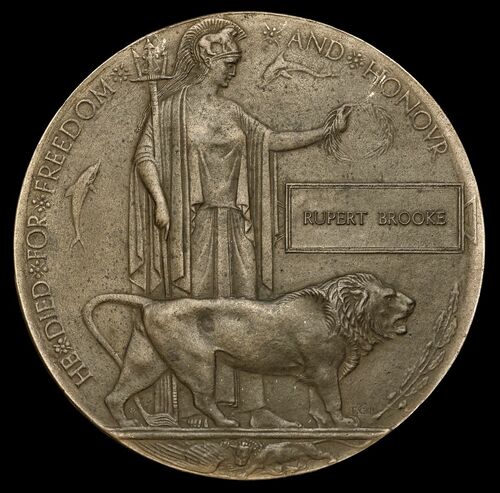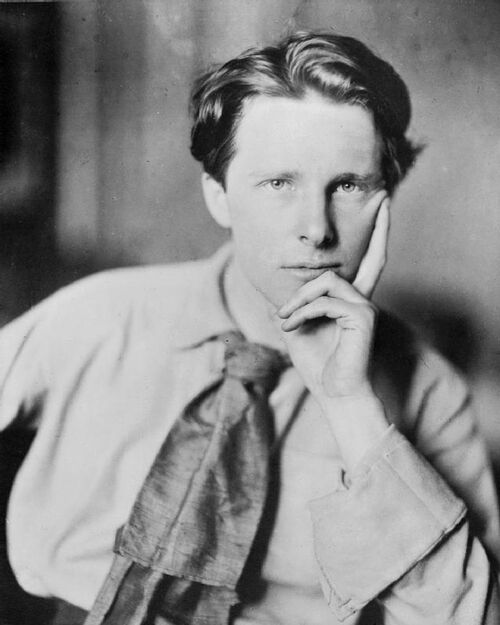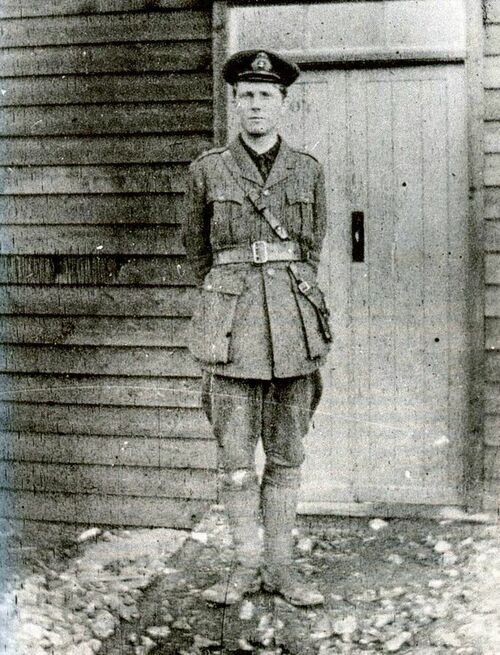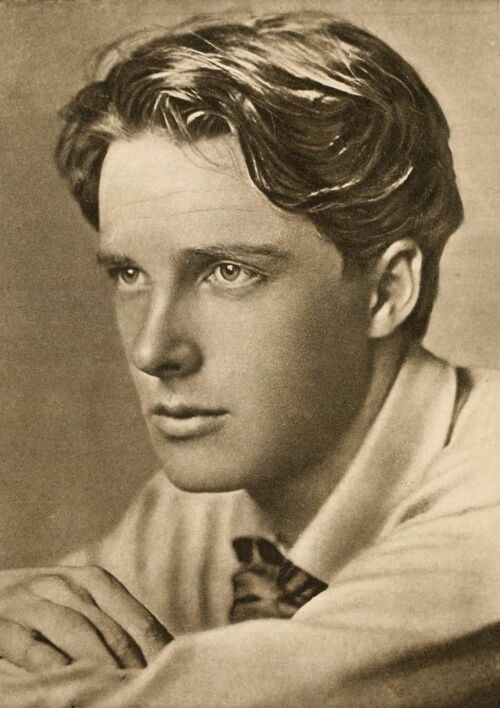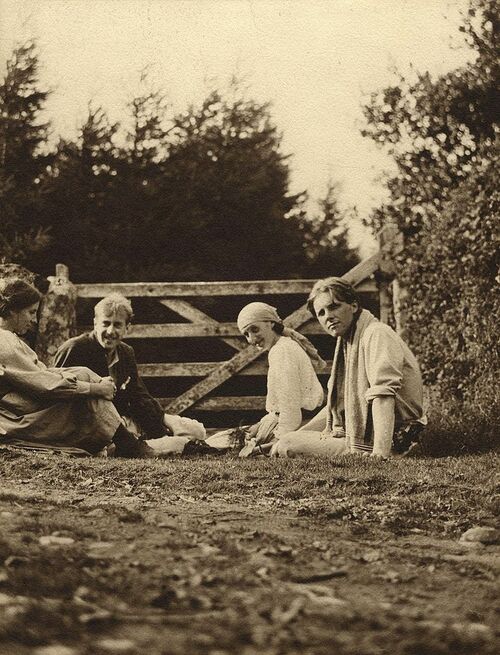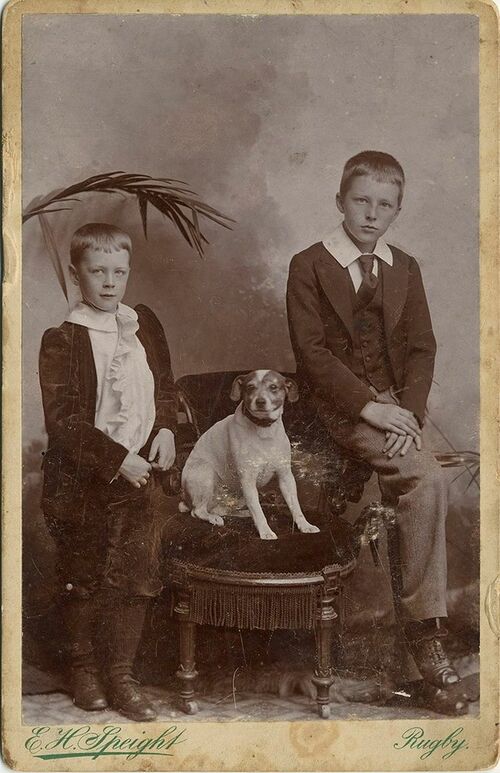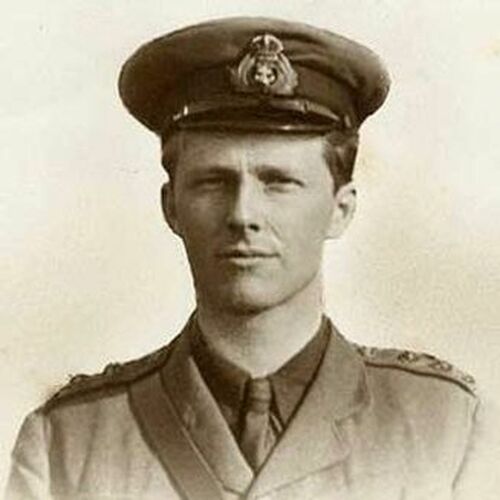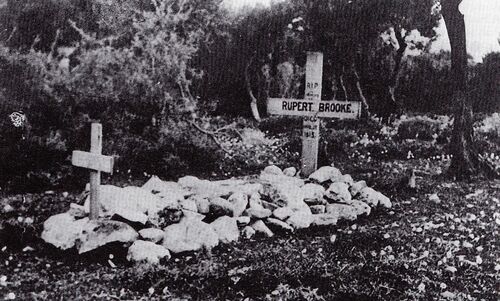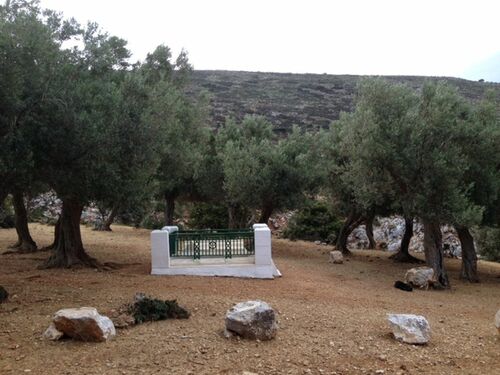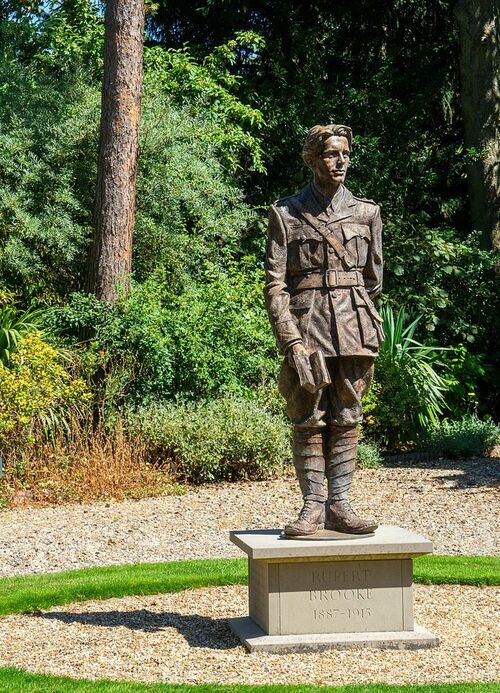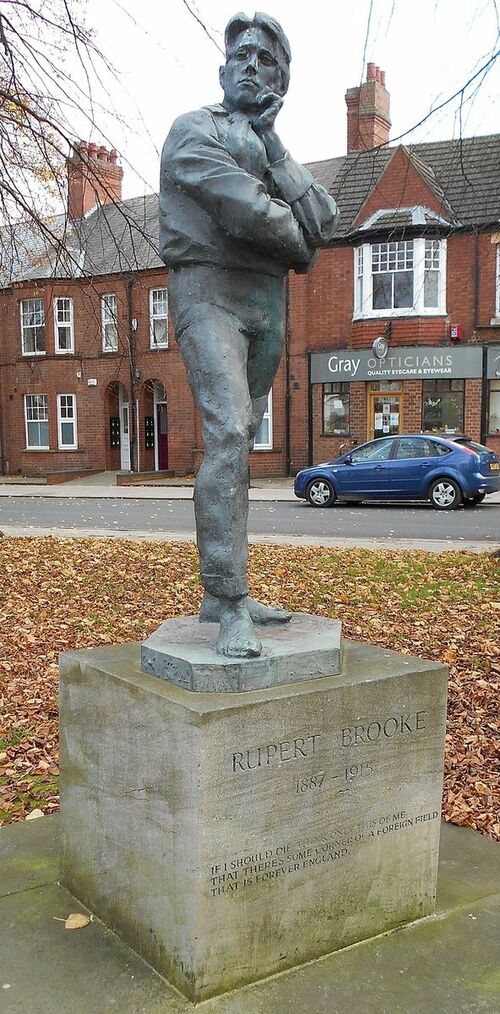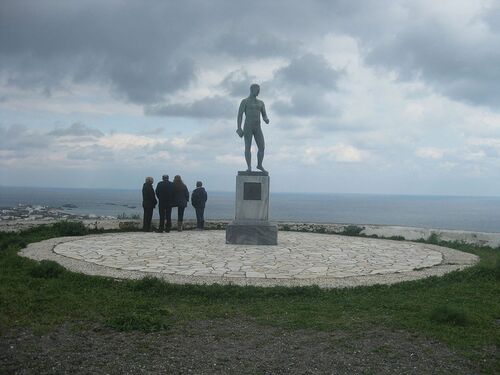Auction: 23003 - Orders, Decorations and Medals
Lot: 59
'Rupert Brooke is dead. A telegram from the Admiral at Lemnos tells us that this life has closed at the moment when it seemed to have reached its springtime. A voice had become audible, a note had been struck, more true, more thrilling, more able to do justice to the nobility of our youth in arms engaged in this present war, than any other more able to express their thoughts of self-surrender, and with a power to carry comfort to those who watch them so intently from afar. The voice has been swiftly stilled. Only the echoes and the memory remain; but they will linger.
During the last few months of his life, months of preparation in gallant comradeship and open air, the poet-soldier told with all the simple force of genius the sorrow of youth about to die, and the sure triumphant consolations of a sincere and valiant spirit. He expected to die: he was willing to die for the dear England whose beauty and majesty he knew: and he advanced towards the brink in perfect serenity, with absolute conviction of the rightness of his country's cause and a heart devoid of hate for fellow-men.
The thoughts to which he gave expression in the very few incomparable War sonnets which he has left behind will be shared by many thousands of young men moving resolutely and blithely forward in this, the hardest, the cruelest, and the least-rewarded of all the wars that men have fought. They are a whole history and revelation of Rupert Brooke himself. Joyous, fearless, versatile, deeply instructed, with classic symmetry of mind and body, ruled by high undoubting purpose, he was all that one would wish England's noblest sons to be in the days when no sacrifice but the most precious is acceptable, and the most precious is that which is most freely proffered.'
Winston Churchill's highly evocative obituary, as published in The Times.
The important Great War Bronze Memorial Plaque awarded to Sub-Lieutenant Rupert Brooke, Royal Naval Volunteer Reserve & Royal Naval Division
Ranking highly in the first division of Poets to emerge during the Great War, he had excelled whilst at Cambridge University and thrived in that heady environment which allowed him to grow and experiment in all aspects of his life; a self-proclaimed bisexual, Brooke had lost his virginity in a homosexual liaison before embarking on several explosive affairs which saw him crossing paths with several key players in the Bloomsbury Group - W. B. Yeats considered that he was '...the most Handsome man in England'
A veteran of the Defence of Antwerp in October 1914, Brooke wrote his name into history with his series of Sonnets before tragically succumbing to blood poisoning off Gallipoli on St. George's Day 1915; just three weeks prior his finest work, The Soldier, had been read aloud on Easter Day at St. Paul's Cathedral, the words so powerful they latterly brought a Field Marshal to tears
Great War Bronze Memorial Plaque (Rupert Brooke), with Woolwich Arsenal 'WA' punch to the reverse, together with its Buckingham Palace enclosure, traces of adhesive and previous mounting to reverse, very fine
Purchased circa 1985, Cambridge.
XRF (X-ray fluorescence) testing undertaken on 20 September 2023. The results of testing on four Memorial Plaques tested to provide an accepted metal signature with the following results:
Copper (Cu) - 86.57-87.84%
Lead (Pb) - 3.01-6.25%
Zinc (Zn) - 2.53-5.05%
Tin (Sn) - 4.10-4.27%
This Memorial Plaque delivers the following reading:
Copper - 87.36%
Lead - 5.03%
Zinc - 3.07%
Tin - 4.15%
The close range of the four main elements in the metallurgical makeup in comparison to this Plaque, especially the result for the Tin content, is worthy of note.
It is worth quoting his Royal Naval Volunteer Reserve Service Record, held by The National Archives (ADM 337/117/370, refers):
'Rupert Brook Sub Lieutenant Tempy.
Victory for R.N. Division (Hood Bn.) 14/9/14.
D.D. [Discharged Dead] 23.4.15. (Telegram from "Ranopus" via S.N.O. Mudros). Will be buried ashore on 24/4/15. Died from pneumococcus septicaemia. Date from Army Death Certificate - 23 April 1915. Buried in Olive Groves one mile up Valley NW of beacon of N Shore of Tribouki Bay, Skyros Island, Gallipoli. 23.4.15 by Chaplain B. J. Failes.'
Rupert Chawner Brooke was born on 3 August 1887, the third of four children of Wille and Ruth, both of whom had met whilst working at Fettes College. By the time of Rupert's arrival, his father was Master of School Field House at Rugby School. It is worth noting that his middle name was often incorrectly cited as 'Chaucer' - even upon his official Royal Naval Division Service Record (TNA ADM 339/3/225, refers).
Young Brooke was educated at Rugby, taking to Latin and Greek - also being mentored by St. John Lucas - before going up to King's College, Cambridge in October 1906. Reading Classics, he thrived in the exciting environment he found himself. Brooke joined the Apostles and was eventually elected President of the Fabian Society whilst at Cambridge and formed friendships and relationships which would shape his following years. At this formative time in his life he also began to explore his own sexuality, which included having spent an evening skinny-dipping with Virginia Woolf. He latterly wrote that he was '...one-half outright heterosexual, one-quarter outright homosexual and one-quarter sentimental homosexual.'
Indeed it would be that he would lose his virginity to Denham Russell-Smith in the Autumn of 1909. Clearly possessing an appetite which needed to be sated, he pursued his first heterosexual relationship with Élisabeth van Rysselberghe, daughter of painter Théo van Rysselberghe. Whilst at Cambridge he also crossed paths with 'Ka' Cox (Katherine Laird Cox), with whom a passionate affair blossomed. Sadly that ran its course and broke down, an event which caused Brooke severe paranoia and an eventual nervous breakdown.
In the period Brooke lived, laughed and clearly loved many members of the Bloomsbury Group. His good looks and remarkable brain attracted admirers from all corners and those who were associated him read like a 'Who's Who' of the period.
Having recovered from his breakdown, Brooke took up on a series of far-flung travels and writing retreats, publishing the results in the Westminster Gazette. Returning via a trip across the Pacific and into the South Seas, he may well have left progeny with a Tahitian named Taatamata. Brooke was clearly forging a career that was set to carry him to the highest table of his chosen career. He lived at the Old Vicarage & The Orchard, Grantchester. His good looks led Frances Cornford to write:
'A young Apollo, golden-haired,
Stands dreaming on the verge of strife,
Magnificently unprepared
For the long littleness of life.'
With the outbreak of the Great War, Winston Churchill offered him a commission in the Royal Naval Division, via the Royal Naval Volunteer Reserve, which he duly accepted. Brooke served at Antwerp in October 1914 with the Anson Battalion. Lucky to get away, unlike so many of his comrades, he joined the Hood Battalion on 25 October 1914.
Perhaps his most seminal work was conducted in the period, writing and publishing sonnets on his take on the opening shots of the Great War. The two most striking are perhaps The Dead:
'Blow out, you bugles, over the rich Dead!
There's none of these so lonely and poor of old,
But, dying, has made us rarer gifts than gold.
These laid the world away; poured out the red
Sweet wine of youth; gave up the years to be
Of work and joy, and that unhoped serene,
That men call age; and those who would have been.
Their sons, they gave, their immortality.
Blow, bugles, blow! They brought us, for our dearth.
Holiness, lacked so long, and Love, and Pain.
Honour has come back, as a king, to earth,
And paid his subjects with a royal wage;
And Nobleness walks in our ways again;
And we have come into our heritage.
These hearts were woven of human joys and cares,
Washed marvellously with sorrow, swift to mirth.
The years had given them kindness. Dawn was theirs,
And sunset, and the colours of the earth.
These had seen movement, and heard music; known
Slumber and waking; loved; gone proudly friended;
Felt the quick stir of wonder; sat alone;
Touched flowers and furs and cheeks. All this is ended.
There are waters blown by changing winds to laughter
And lit by the rich skies, all day. And after,
Frost, with a gesture, stays the waves that dance
And wandering loveliness. He leaves a white
Unbroken glory, a gathered radiance,
A width, a shining peace, under the night.'
The most seminal is without doubt Sonnet V, The Soldier:
'If I should die, think only this of me:
That there’s some corner of a foreign field
That is for ever England. There shall be
In that rich earth a richer dust concealed;
A dust whom England bore, shaped, made aware,
Gave, once, her flowers to love, her ways to roam,
A body of England’s, breathing English air,
Washed by the rivers, blest by suns of home.
And think, this heart, all evil shed away,
A pulse in the eternal mind, no less
Gives somewhere back the thoughts by England given;
Her sights and sounds; dreams happy as her day;
And laughter, learnt of friends; and gentleness,
In hearts at peace, under an English heaven.'
Those piercing lines were chosen to be read on Easter Day (4 April) 1915 at St Paul's Cathedral by Dean William Inge. Brooke had been transferred to the Mediterranean Expeditionary Force in February 1915 and was only to live for a further three weeks. Whilst serving in Egypt he had been suffering from gastroenteritis after a mosquito bite became infected. French surgeons carried out two operations to drain the abscess whilst he was aboard the Hospital Ship Duguay-Trouin. His great friend, William Denis Browne was with him in the final moments:
'I sat with Rupert. At 4 o’clock he became weaker, and at 4.46 he died, with the sun shining all round his cabin, and the cool sea breeze blowing through the door and the shaded windows. No one could have wished for a quieter or a calmer end than in that lovely bay, shielded by the mountains and fragrant with sage and thyme.'
The date of his tragic death off Gallipoli on 23 April 1915 could not have been fitting. Brooke passed on St George's Day, he was a true son of England and the epitome of 'The Soldier'. Perhaps the finest short account of his remarkable life was penned by Winston Churchill, who felt moved to write his obituary after learning of his death (as previously quoted in full). He had also telegrammed to his brother, John, asking '...endeavour if your duties allow, to attend Rupert Brooke's funeral on my behalf. We shall not see his like again.'
After Field Marshal Allenby had been informed of the death of his son Michael in July 1917, at that time aged just 19, he broke down in tears whilst reading one of Brooke's War poems.
His 1914 & Bar Trio and Memorial Plaque were sent to his mother. It is understood his 1914 Star resides in a Private Collection. Whilst no Rolls survive for the issue of any Memorial Plaques issued for those who made the ultimate sacrifice during the Great War, as his official R.N.V.R. Service Record has his name as simply 'Rupert Brooke', it would have been issued as thus.
By way of commemoration, his opening words of 'The Dead' are inscribed upon the War Memorials of the Royal Naval Divsion Memorial in London and upon the Cenotaph in Wellington, New Zealand. He was one of sixteen Great War Poems to be honoured at Poets' Corner in Westminster Abbey, which was opened by Wilfred Owen on 11 November 1985. It reads:
'My subject is War, and the pity of War. The Poetry is in the pity.'
The original painted wooden cross which marked his grave at Skyros originally read:
'Here lies the servant of God, Sub-lieutenant in the English Navy, who died for the deliverance of Constantinople from the Turks.'
This was eventually replaced by a memorial by the Greek sculptor Georgios Bonanos. The wooden cross was returned to his mother who placed it to rest in the family plot at Clifton Road Cemetery, Rugby. In 2008, due to weathering, it was removed and now resides at Rugby School with the memorials of other Old Rugbeians.
Statues stand to him at Rugby, Grantchester and on Brooke Square, Skyros. A Blue Plaque to him is to be found in Grantchester and he is also recorded on the Grantchester War Memorial at St. Andrew and St. Mary, High Street, Grantchester.
The C.W.G.C. gives a moving note on their website:
'Rupert Brooke was a published poet as early as 1911. Suffused with patriotism he was happy to die for his country in battle. He died, not in battle, but of acute blood poisoning and was buried on the Greek Island of Skyros. Brooke left his royalties to his friends, namely Lascelles Abercrombie, Wilfrid Gibson and Walter de la Mare, providing them with literary independence for the rest of their lives.'
Reference Sources:
Rupert Brooke: Life, Death and Myth, Nigel Jones.
1914 and Other Poems, Rupert Brooke.
Royal Naval Division, Douglas Francis Jerrold.
Subject to 20% VAT on Buyer’s Premium. For more information please view Terms and Conditions for Buyers.
Sold for
£21,000
Starting price
£10000

